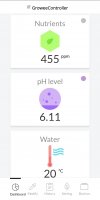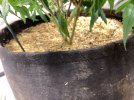I questioned the practice swapping the res every week another site when I started growing (again) in 2021 and the responses were, generally speaking, "because…".
Swapping a res every week in RDWC/DWC is a good revenue generator for companies selling fertilizer but it may not be the best thing for the plants and, for me, it's very far down the list of "things I like to do".
Two items to ponder — how to reduce my cost of materials (chemicals) and how reduce the frequency of swapping the res.
The cost of nutrients is staggeringly low once you move away from the pretty bottles. Buying bottled nutrients makes chemical companies and delivery companies a lot of money. A gallon of ferts costs the "manufacturer" almost nothing (material cost) for the few grams of chemicals that are in a one gallon bottle. I suspect that the gallon jug and the label cost more than the chemicals. And once they slap the label on it, they pay FedEx/UPS to move a gallon of water + a tiny amount of chemicals across the country.
Instead of doing that, go with dry ferts. I use Jacks 3-2-1 for RO and my material cost is $1.18 for 26 gallons of nutrients. These were the prices when I bought the dry ferts. They're higher know, no doubt.
View attachment 5464998
The issue falls under "reservoir maintenance" and that involves stepping away from the "because…" approach. Some growers don't want to stray from that path too much and I understand that. On the other hand, life can get a lot better when a grower gets into
understanding why a nutrient reservoir should be instead of
accepting that a nutrient reservoir should be changed simply because the Earth has spun around its axis seven times.
My experience growing cannabis has been limited to RWDC but I can see the attraction to SIP's. Unless you're doing coco in a SIP, though, you're still at the mercy of not really knowing what's in your soil (unless you make your own) and, second, it's much slower to respond to inputs. If you're growing in a medium other than hydro, if you step on your dick, it can take some time to recover.
I've attached two documents that helped me develop some insights into the process. In addition to those documents, below are some links that I've found useful on a web site about hydroponics. The web site is hosted by Dr. Daniel Fernandez. Even though he has only a Bachelor's n Chemistry, he has been a coauthor at least one paper with Bruce Bugbee and he's also is the author of HydroBuddy, so I think his insights carry some weight.

scienceinhydroponics.com

scienceinhydroponics.com

scienceinhydroponics.com

scienceinhydroponics.com

scienceinhydroponics.com

scienceinhydroponics.com

scienceinhydroponics.com

scienceinhydroponics.com

scienceinhydroponics.com

scienceinhydroponics.com

scienceinhydroponics.com

scienceinhydroponics.com

scienceinhydroponics.com

scienceinhydroponics.com

scienceinhydroponics.com

scienceinhydroponics.com

scienceinhydroponics.com

scienceinhydroponics.com

scienceinhydroponics.com

scienceinhydroponics.com

scienceinhydroponics.com

scienceinhydroponics.com

scienceinhydroponics.com






